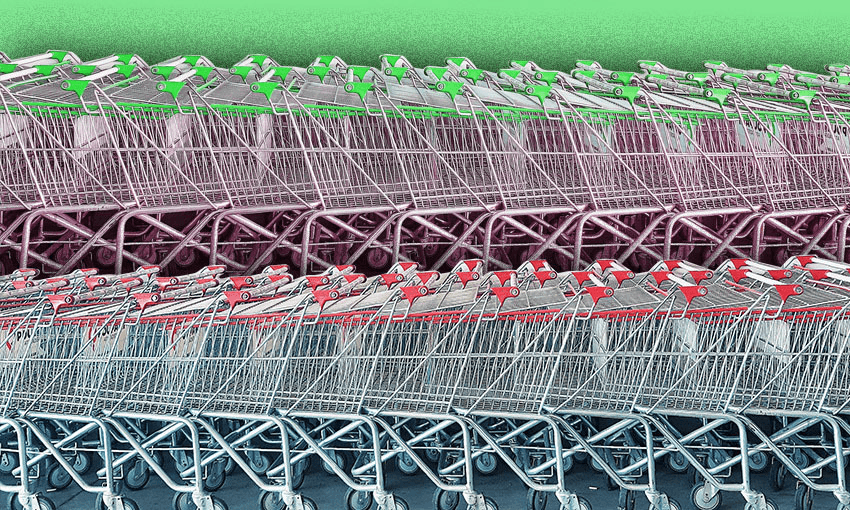New Zealand’s two grocery giants have been warned by the government’s guardian of free markets to allow significantly more competition into the sector – or parliament will be told to break you up. Justin Giovannetti reports.
The conclusion that New Zealand’s grocery bills are among the world’s most expensive won’t come as a surprise to many shoppers, but today’s study from the Commerce Commission explaining how food got so expensive makes for bleak reading.
The country’s grocery sector is effectively broken, the commission found. It’s a duopoly, split between two grocery giants that squeeze their suppliers, control food prices by dominating wholesale, don’t compete for customers and then offer misleading specials to keep them confused. In the end, Foodstuffs and Woolworths pocket excessively high profits, the study concluded.
The market study, only the second undertaken by the commission, was ordered by the government last November into the $22 billion grocery sector. Today’s draft report will be followed by a final set of recommendations in November.
The clock is now ticking to make the grocery sector competitive again.
Commission chair Anna Rawlings outlined a number of voluntary actions the two food giants could take to create new competition in a sector where they’ve virtually eliminated it. If they choose not to act or take it too slow, she’ll advise the government to consider breaking up the companies.
The report concluded that New Zealand’s groceries are the sixth most expensive in the OECD, a group of rich countries. The price isn’t solely due to shipping and local labour costs. Instead, the commission found that much of the increase was going into what it found were “excessive” profits.
The commission expected the two retailers to make, at most, a 6% return on the capital they invested. Instead, it found that Foodstuffs had a nearly 24% profitability rate, while Woolworths was at about 22%.
Foodstuffs, which owns the Pak’nSave, New World and Four Square brands, said it was looking at the “wide-reaching implications” of the report, but said the commission’s calculation of its profitability was inaccurate. It did not offer a revised figure.
There are similarities to the commission’s first study, of the fuel market. It concluded at the end of 2019 that consumers were getting a rotten deal at the pump, with the prime minister saying they were “getting fleeced”.
While petrol prices haven’t moved much yet, Rawlings said there’s a delay between finding the problem, drafting legislation, implementing it and seeing prices come down. New fuel regulations are about to take effect.
There could be a similar delay for the grocery sector. “You can expect that any intervention that depends on the recommendations might take some time,” said Rawlings. However, she said she hopes some measures might be implemented voluntarily.
The commission looked overseas to find examples of similar grocery sectors that were concentrated between so few companies but were made competitive again. It found none. “New Zealand’s issues appear to be unusually difficult,” said commissioner John Small.
Commerce minister David Clark said he’s waiting for the final report in November, but the government is prepared to act. “We are determined to ensure that Kiwis get a fair deal,” he said.
Clark repeatedly mentioned a “fair deal”, over a dozen times, in a 10-minute press conference. He wouldn’t say whether the government would be willing to legislate an end to the duopoly.
There are some easy fixes that could take place almost right away. With the two companies controlling both retail and the wholesale market, they could allow small competitors more access to wholesale prices. They could compete more on prices internally to drive them down.
The companies could also sign codes of conduct with suppliers. Right now, the commission found that the two companies push far too much risk and uncertainty onto suppliers. Citing a “power imbalance”, it said the giants force suppliers to accept difficult terms or threaten to cut them off completely. They demand up to two months to pay suppliers and there have been cases where they’ve stockpiled items, purchased at discount prices for specials, only to sell them later at full price, pocketing the difference.
One of the report’s suggestions is that the government could create an independent wholesale operation – either a new company to compete with the existing chains, or by separating the wholesale businesses from the existing giants.
If those measures fail, the commission said that a third large retailer in New Zealand could help reduce prices. The competitor could be created either by requiring both companies to sell off a number of stores across the country, or by providing incentives for a completely new company to rise.
According to Rawlings, the commission isn’t sure yet whether the new competitor would require government support to start. She said there could be a similarity to the move to break up the telecommunications monopoly of Telecom, which included spinning off Chorus to control the network infrastructure across the country. Chorus then needed government support to build new broadband.
Countdown, a division of Woolworths, said in a statement that it was still looking at the report, but “some of the recommendations would have significant implications”.
It also warned that “New Zealanders will have strong thoughts and feelings about the report and would ask that they keep it kind when shopping in our stores and treat our teams with respect”.
Asked about the statement, Rawlings said she was surprised by the company’s warning that its staff would becoming a target because of the report. “I’m stunned by the suggestion that a local checkout operator should be treated poorly as a consequence,” she said.

